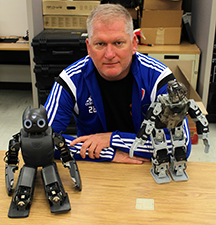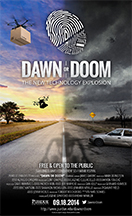Friend or foe? Robots could be either. You might even marry one
September 11, 2014
 |
|
Eric Matson, Purdue University associate professor of computer and information technology, with a couple friends (small, commercially available programmable robots that he uses in his robotics class and research.) Matson's research focuses on the intersection of technologies such as robotics, artificial intelligence and sensor networks and he’s involved in developing firefighting robots and robots to assist senior citizens in living independently. |
WEST LAFAYETTE, Ind. - When Purdue University professor Eric Matson teaches his robotics class, he asks his students a simple question on the first day. Would you consider marrying a robot?
Generally, after they stop laughing, about 99 percent of the class will say no, no way. But by the end of the semester, with the students now schooled in robotics and the possibility of advancing technology that could lead to a truly human-like robot, Matson finds that 40 to 50 percent of the class now sees enough merit in a robot spouse to at least consider it.
“If you wanted to watch the game you could turn them off,” Matson says. “If you wanted to go shopping you could turn them off. They're not going to complain.”
Of course, the downside is that if too many humans decide to marry a robot the continuation of the human race comes into question, not to mention the rabid social debate and legal wrangling robot marriage is sure to spark.
That robots, whether for marrying or myriad other purposes, are something of a double-edged sword should come as no surprise, says Matson. A Purdue associate professor of computer and information technology, he’s involved in developing firefighting robots and robots to assist senior citizens in living independently, among other projects.
“Since the dawn of man, every technology's been good and every technology has a bad side,” Matson says. “The wheel is great. But what's been the downside? A lot of people die in accidents. I think robots will be one of those transformative objects in our life, one that provides great help but also introduces new risks.”
Matson, whose research focuses on the intersection of technologies such as robotics, artificial intelligence and sensor networks, will look at both sides in a lecture titled “Will Robots Insure Our Safety or Place Us at Risk?” during a Purdue conference called “Dawn or Doom: The new technology explosion.”
The Dawn or Doom conference is being held Thursday (Sept. 18) on the Purdue West Lafayette campus and is free and open to the public.
The firefighting robot Matson and other Purdue researchers worked on with Korean collaborators and the vacuuming robots sweeping many floors today would generally be classified on the good side, even if the robot sweeper does miss a spot now and then. Firefighters were a bit leery at first, in part over concerns about being replaced, but it didn’t take much for them to come around.
“Ultimately, they see that if the robot gets hurt, it’s easy to replace, but a person isn’t,” Matson says. “If the building collapses, it may crush the robot, it may incapacitate the robot, but the fireman's not a fatality.”
 |
However, neither the robot vacuum nor the firefighting robot think for themselves. The robotic firefighter is actually operated by the human version, outside manipulating a remote control system.
While widespread deployment of autonomous robots for a variety of purposes may still seem like science fiction, Matson doesn’t doubt that the day is coming when they will be an integral part of human life, and maybe sooner than we think.
“Ten years ago I don't have a cell phone, especially a smartphone,” he says. “I never thought I could get on my computer and reach every person in the world instantaneously 15 or 20 years ago.”
Autonomous service robots that could make sure older folks eat, take their medicine, help them move around the house or notify somebody if something is wrong have a clear upside. But suppose something goes wrong because of glitch or a hacker who breaks into the networked robot (you will want to be able to check in with it via your smartphone after all).
“There are a lot of things it could do to really hurt that person when its intent is to help that person, especially if there's an outside influence,” Matson says.
Never mind the prospect of armed military robots, or robots with the facility to, in essence, learn, alter their own programming and choose courses of action that may or may not be to our benefit. Or robots we might consider marrying.
Matson’s point is that we need to confront these things now and keep thinking as the technology inexorably develops.
“The big question for me is not whether you have a good side and a bad side, because you will,” Matson says. “The big question for me is how do we manage the good and how do we manage the bad?”
Contact: Greg Kline, 765-494-8167, gkline@purdue.edu
Source: Eric Matson, 765-494-8259, ematson@purdue.edu

